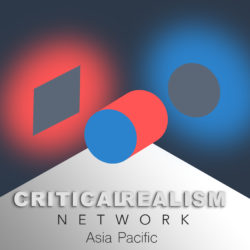These reflections are written by Joselito Ranara JIMENEZ, our critical realist from Osaka, Japan, who was a participant at the recent “Beyond Positivism” Conference in Montreal, Canada.
The Critical Realism Network held the Beyond Positivism conference, with support from the John Tempelton Foundation, last August 8-10, 2017 at Montreal, Canada. Sixty-seven (67) presenters tackled compelling topics and engaging questions on theory, methods and values, attempting to crystallize what a post-positivist social science looks like. Key thinkers in Critical Realism and leading academicians in Sociology, Philosophy, History, Social Psychology were also on hand to provide insightful feedback.

Just being there in the conference with fellow searchers of a post-positivist social science was, in one word, therapeutic. I listened and interacted with others who had hit the same dead ends and indefensible stances that positivism inflicted. Beyond just confirming that I hadn’t gone mad in my own research dilemmas – or, at the very least, that I wasn’t alone in having gone mad – the honest reflections and courageous theorizing of fellow presenters showed me a path forward in my own research deadlocks. I thus found myself recording the sessions – even the parallel ones I wasn’t able to join (this I did by leaving a voice recorder running) – like they were water to a parched mouth, vowing to listen to them carefully in the 18-hour trip back home.
In one session I found myself sitting beside Doug Porpora, whose recent book “Reconstructing Sociology” I had chosen as my complimentary conference book, and I shared with him my sentiments on the usefulness of the conference. “Ito, It has been good meeting a critical realist orphan from Japan. Please consider me a kin,” Doug’s personal message on my complimentary book read. That phrase – “Critical Realism Orphan” – captures succinctly my two key takeaways from the conference.
Takeaway 1: Finding a support system is essential for early adopters of critical realism.
I had gotten into critical realism mid-way through my doctoral program. I had been studying Filipino overstayers in Japan and the theoretical framework I was using till that point – a positivist one – wasn’t helpful in finding coherence on the toughest paradoxes I saw up close in the lives of Filipino overstayers. Why, for instance, did overstayers stubbornly persist even when living and working conditions had become so bad? My positivist approach impelled me to search for some all-encompassing explanation (i.e. covering law) that would apply to all overstayers. It just wasn’t doable. Positivism thus died on me, and I became an orphaned researcher with no theoretical parent.
As an orphaned researcher, I was surprised to hear other attendees also express their tentativeness in the way they deployed critical realism concepts, prefacing their presentations with their own stories of how they found positivism as simply inadequate to capture “thick” realities. Alford Young, who gave a rousing talk on qualitative methods and critical realism, also noticed something similar, that presenters felt a need to declare their “position on the margins of critical realism, and in some ways questioning the appropriateness of being before this group.”
Takeaway 1 then is the importance of linking up with a support system that can provide important feedback, validation and, most importantly, that sense of community and solidarity. I felt a strong sense of affinity with the stories shared by both presenters and plenary speakers on how critical realism has to be brought down to the level of methodology such that the base of applied research using critical realism can be expanded. Dan Little, highlighted how critical realism is moving beyond just being a domain of philosophers and now into the realm of practitioners of social science (see Dan’s post about the conference here). Having a vibrant support system that early adopters/orphaned researchers of critical realism can proactively reach out to would definitely help achieve this.
But I hadn’t, just yet, fully chosen critical realism as my new “parent.” Unlike a child orphan who may readily embrace any person ready and willing to give love as a new parent, I was an “old-dog” orphan, if you will, with a deeply-ingrained heritage. I was a hard-core quantitative guy, and fiercely exclusive at that. I was a proud statistician. This was/is my inescapable scholarly lineage, just as every orphan carries the genes of his biological parents, including whatever history or circumstances the parents had. Thus, my search for new parents was accompanied by feelings of “loss.” As I got deeper into critical realism and I saw its robustness in social explanation, I felt I was saying goodbye to my quantitative side. I had this sense of having wasted what for me were my prime years doing just purely quantitative approaches to social explanation. The conference provided a win-win resolution to this feeling of “loss,” and this brings us to my second takeaway.
Takeaway 2: Mixed methods (quantitative + qualitative) and critical realism can work together.
Wendy Olsen argued for a quantitative, post-positivist social science: positivists view data as measuring a world accessible to us through the senses (empirical methods) and what the data tell us is exhaustive of what that world is; but how the data itself is revealed to us is conditioned by “data-generating mechanisms” (i.e. structures) of the same world described by the data.
Wendy’s talk made me realize that I could go back to the strong quantitative heritage of my deceased positivist parents. By anchoring back quantitative data (empirical domain) to events (actual domain) and in turn events to deep structures (real domain) I could still be consistent with the core CR tenet of ontological realism and hold onto my quantitative heritage. This made me feel re-anchored: from a positivist orphan, searching for universal truths through reified data, to now a critical realist orphan, using data as a starting point of claims (epistemic relativism) but not making those claims the end in themselves, moving inevitably to an adjudication (judgmental rationality) of which of those claims might be more robustly true. The difference here is that as an orphan of the former type I was repelling away from positivism while as an orphan of the latter type I am now drawn to critical realism.
As a critical realist orphan from Japan, I thus enjoin other scholars to join us in the Critical Realism Network for Asia Pacific (CRN-AP). If you may be feeling some loose ends in how your theoretical tools are able to adequately give explanations of the slices of reality that you are investigating, then in the CRN-AP you will find a community of peers (not one with ready answers that will then be prescribed to you for your superficial adoption) that will accompany you as we all search together, ask critical questions together. The scholarly environment at the CRN-AP is one of collegiality but also isn’t one of the “blind-leading-the-blind,” so to speak. Johnny Go, S.J. will inspire all of us in the same way that Roy Bhaskar inspired him (as he narrates here). Phil Gorski, who leads the Critical Realism Network based at Yale University and who has given his full support to the CRN-AP, will also undoubtedly be a great resource (click here to see some of their very useful learning resources on critical realism). The CRN-AP will also be working very closely with the International Association of Critical Realism.
Click here to join the Critical Realism Network for Asia Pacific!. Kindly email us at critrealap@gmail.com if you have any questions and clarifications.

